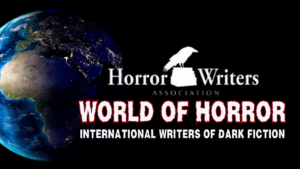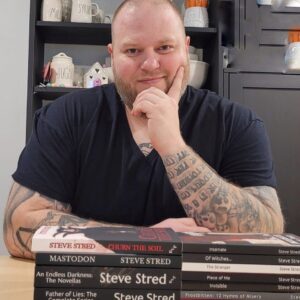World of Horror: Interview with Steve Stred


A two-time Splatterpunk-nominated author, Steve Stred lives in Edmonton, Alberta, Canada, with his wife, son and their Staffy, Cocoa.
His work has been described as haunting, bleak and is frequently set in the woods near where he grew up. He’s been fortunate to appear in numerous anthologies with some truly amazing authors.
He is an Active Member of the HWA.
Website: stevestredauthor.ca, Twitter: @stevestred, Instagram: @stevestred, Tik Tok: @stevestredauthor, Universal Book Link: author.to/stevestred
What was it about the horror genre that drew you to it?
Honestly, I’ve always been drawn toward the horror/dark fiction world because it’s a genre that can make you feel every single emotion but also tests us with how we’d react to the unknown and those events you can’t prepare for. Within a great book you will laugh, cry, cheer for, root against and scream with terror. And that can be a book about a haunted house or a rabid dog or a creature that consumes everything in its path. Of all the genres out there, horror easily offers the most variety, and when I was a young kid, horror filled everything in my imagination I was looking for, and that’s what brought me to this world.
Is there a horror tradition in your country, in your culture? A taste for horror, a market? Not necessarily literature; perhaps oral tradition too.
I was born and raised in Canada and still live in Canada, so there’s two parts to that. In the white Canada world, no, there aren’t really any “horror traditions” that I can think of. But, within Canada, we have a wonderfully vibrant indigenous culture, spread from sea to sea and every area in between, and they all have really intriguing oral traditions. The most common “horror” oral tradition within the indigenous peoples I would suspect would be regarding the Wendigo. I didn’t know much about Wendigo for many years; instead, the story I heard more often where I grew up was about Sasquatch/Bigfoot, as there were a number of sightings in the West Kootenay area, where I was raised.
Who are some of your favorite characters in horror, internationally and/or in your own culture?
I hope I’m answering this question correctly, but I am a huge fan of Wendigo, Djinn, and Baba Yaga stories. All three have an easy ability to unsettle me, and you can go in many different directions with them. Also, shapeshifting stories in general are wonderfully fear-inducing. As for a specific example, Algernon Blackwood’s The Wendigo is particularly frightening. For the most part, anything involving folklore—whether it be creatures/trolls/witches, etc.—I’m down for reading it.
Do you make a conscious effort to include characters and settings from your country in your writing and if so, what do you want to portray?
It’s funny, because being Canadian, we’ve always been pushed to “Americanize” everything. Spell color “color” and not “colour.” I keep the u’s in most of my words and have even seen some reviews of my own work where people point out all the spelling mistakes because of that Canadian u—haha!
It wasn’t until I had an in-depth conversation with fellow Canadian author, Andrew Pyper (who himself frequently has Canadian locations and/or Canadian characters in his novels), who gave me the advice that to not accept my Canadianisms would be doing my writing voice and style a disservice. I’m proud of where I come from, and all my work is based in Canada, near where I grew up, but over the last little bit, instead of leaving the locations anonymous, I’ve started to add in details and place names to showcase this amazing country.
Through this, what I want to portray is not only how wonderful the people are here but also how vast of a country Canada is. There’s lots of wilderness for people to go missing in and for creatures to devour them while they sleep in their tents/p>
What has writing horror taught you about the world and yourself?
That’s a tough question, because on one hand, I read and write horror as an escape. I don’t watch a lot of TV shows or many movies, but I read every day. When I open a book, I’m whisked away into whatever world I’m visiting on those pages, and I know that I can shut off my anxiety-riddled brain for those few hours while I’m immersed in that world. But, on the other hand, horror works to tackle topical issues and come at those issues from every different angle. No matter what you’re reading in horror, you will come across an ethical or moral decision, and you’ll be forced to ask yourself, What would I do in that situation? I believe that my lifelong love affair with reading horror has helped in my development as a critical thinker.
How have you seen the horror genre change over the years? And how do you think it will continue to evolve, both in the US and in your country?
We’re in the midst of a horror explosion—what with the rise of self-publishing and small press—and coupled with the emergence of social media, we’re all able to be connected faster than ever before. When I was growing up, I had no access to the wider horror world. My introduction was my neighbour sharing her Stephen King books with me when I was eight or nine. It wasn’t until many years later, when I moved near Vancouver, BC, that I was exposed to more authors. One thing I think, what’s really happened and is great, is with the increase in options, more subgenres reach more specific readers. Those people who specifically want “x+y=z” horror can easily acquire it, versus even a decade ago, their selection could be limited by geographic location and/or access to ordering books.
I think we’re at a crossroads with the genre evolving in that the “Big Five” are wanting to fight to get a lot of that market space back—see Barnes and Noble reducing indie ordering—but also in how people get their books in people’s hands. Digital versus physical, etc.
How do you feel the international horror writing community has been represented thus far in the market and what hopes do you have for representation going forward?
Canada has always been very diverse in terms of what is being released, but with the rise of small press, we’re seeing more opportunities for marginalized writers. Can it be better? Absolutely! But right now, it’s great seeing so many ethnicities release amazing work and even better, seeing those releases embraced. The horror market itself in Canada isn’t huge by any means, but within the horror world, we keep having exciting releases come out all the time by amazing ethnic writers.
I’ve also seen a rise in Canadian horror writers breaking into more international markets and readers from all over the world praising the horror that is being released by fellow Canucks.
Who are some international horror authors you would recommend?
Ha! Oh jeez, how much space do I have to answer this? Here in Canada, I’d recommend Andrew Pyper, Duncan Ralston, J.H. Moncrieff, J.R. McConvey, Ian Rogers, Tim McGregor, C.M. Forest, Michelle River, Konn Lavery, Mike Thorn, David Demchuk, Craig Davidson, Ron McGillvary, Mason McDonald, J.A. Sullivan, Marcus Hawke, Chris Marrs, Craig DiLouie, Madison McSweeney, Chris Carolan, Caitlin Marceau, Lor Gislason, Rob Bose, Sarah L. Platt, Ai Jiang, Premee Mohammed, and Alexis Kienlen.
Outside of Canada—and in this case, I’ll bypass the US—you have to read David Sodergren, David Jeffery, Gemma Amor, Alan Baxter, Zachary Ashford, Lee Murray, Geneve Flynn, Lee Franklin, Tim Lebbon, Adam Nevill, B.P. Gregory, Kevin J. Kennedy, Lex H. Jones, David Watkins, Stephanie Ellis, V. Castro, and Alison Faye.
What is one piece of advice you would give horror authors today?
Because I’m a bit cheeky, I’ll offer two.
The first is that none of this is a competition with anyone else. It is 100 percent your journey. Take as much time as you need to write the book you want to write. Once done and once out in the world, remain proud of what you’ve created, but know it is completely out of your hands as to how readers will react to it. It’s like sending your kid off to college.
Second, always be supportive to as many people as you can. Celebrate others’ wins, cheer on their successes and be there to lift people up if they’re down.
The horror world can only grow if we all reach behind us and give a helping hand to others.
And to the writers from your country out there who are just getting started, what advice would you give them?
Again—being cheeky!—here’s two pieces of advice.
One, write the story you want to write, the type of story you want to read.
Two, always be proud of what you put into your story and don’t be afraid to write about where you’re from. It’ll shine through and give it that much more of an authentic feel, and readers will respond to that!
Thank you so much for thinking of me and including me!



